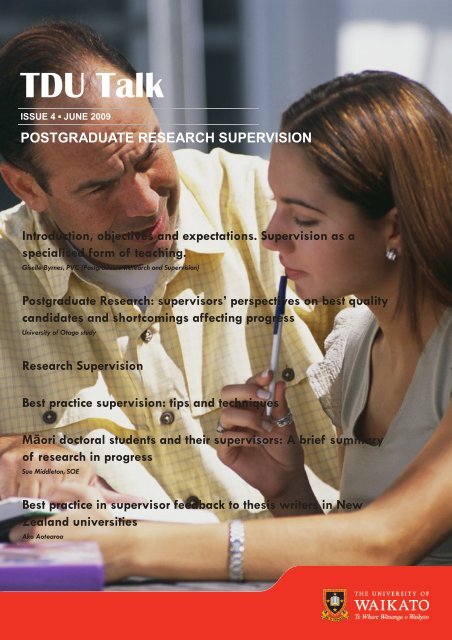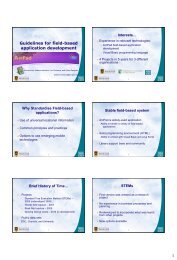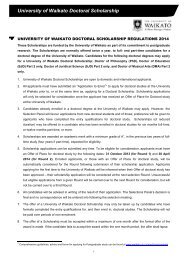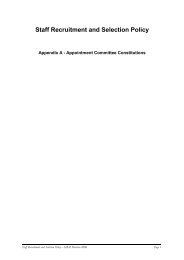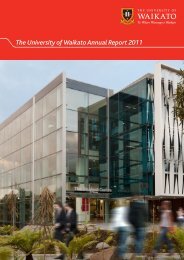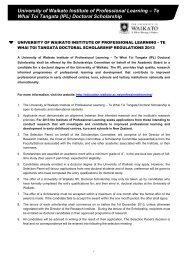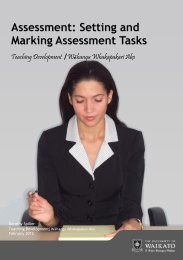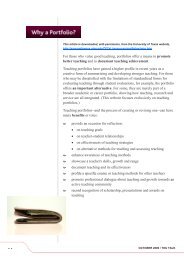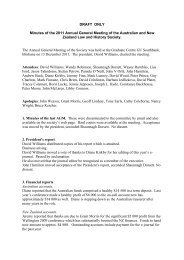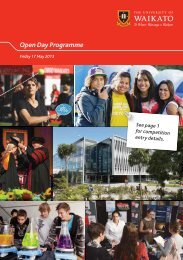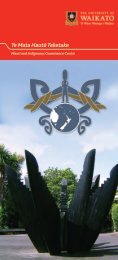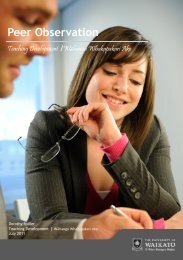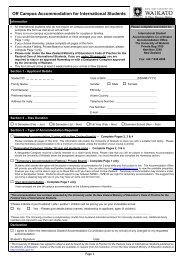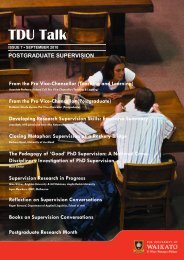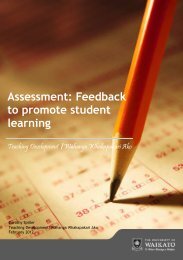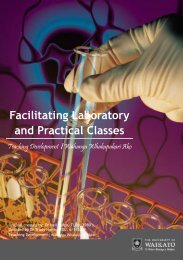Postgraduate Research Supervision - The University of Waikato
Postgraduate Research Supervision - The University of Waikato
Postgraduate Research Supervision - The University of Waikato
You also want an ePaper? Increase the reach of your titles
YUMPU automatically turns print PDFs into web optimized ePapers that Google loves.
TDU Talk<br />
ISSUE 4 ▪ JUNE 2009<br />
POSTGRADUATE RESEARCH SUPERVISION<br />
Introduction, objectives and expectations. <strong>Supervision</strong> as a<br />
specialised form <strong>of</strong> teaching.<br />
Giselle Byrnes, PVC (<strong>Postgraduate</strong> <strong>Research</strong> and <strong>Supervision</strong>)<br />
<strong>Postgraduate</strong> <strong>Research</strong>: supervisors’ perspectives on best quality<br />
candidates and shortcomings affecting progress<br />
<strong>University</strong> <strong>of</strong> Otago study<br />
<strong>Research</strong> <strong>Supervision</strong><br />
Best practice supervision: tips and techniques<br />
Māori doctoral students and their supervisors: A brief summary<br />
<strong>of</strong> research in progress<br />
Sue Middleton, SOE<br />
Best practice in supervisor feedback to thesis writers in New<br />
Zealand universities<br />
Ako Aotearoa
ā<br />
“<br />
Greetings to you all as we approach the mid-winter<br />
solstice and Matariki. This magazine has postgraduate<br />
research supervision as its special focus. My thanks go to<br />
Giselle for her contribution and for bringing together some <strong>of</strong><br />
the most important current thinking about postgraduate<br />
supervision. All academics recognise the importance <strong>of</strong><br />
postgraduates to the success <strong>of</strong> a university, in terms <strong>of</strong><br />
maintaining the flourishing intellectual life <strong>of</strong> the discipline,<br />
sustaining and enhancing the research culture and standing <strong>of</strong> the university, and<br />
the contributions our research students can make to our society. Despite<br />
postgraduates being so important, and doctoral study being the apex <strong>of</strong> students‘<br />
academic careers, the standard <strong>of</strong> research supervision has not always been <strong>of</strong><br />
appropriate quality. Part <strong>of</strong> the reason for this is no doubt due to workload<br />
factors and the relative invisibility <strong>of</strong> supervision sessions as opposed to the<br />
public accountability <strong>of</strong> teaching in large classes. Furthermore, supervision is<br />
not always factored properly into academics‘ teaching load. Sometimes, the<br />
seamlessness <strong>of</strong> the supervisor‘s role means that it is difficult to quantify the<br />
appropriate time allocation. <strong>The</strong> supervision relationship is also a complex one<br />
and sometimes both parties in the relationship do not explicitly clarify their<br />
assumptions and expectations. For me it is very helpful to note that the<br />
university defines supervision a ―highly specialised form <strong>of</strong> teaching‖. If we<br />
bear this in mind it means that all supervisors need to apply the same<br />
pr<strong>of</strong>essional standards that they would to all <strong>of</strong> their teaching. We hope that you<br />
will enjoy this edition and that it provides thought-provoking suggestions for<br />
your supervision practice.<br />
JUNE 2009 • TDU TALK<br />
Best wishes<br />
Dorothy<br />
.”• 2 •
“<br />
Hello everybody and welcome to the world <strong>of</strong> appraisals<br />
and evaluation.<br />
As you are aware, this issue <strong>of</strong> the TDU Talk focuses on<br />
postgraduate teaching and supervision. In terms <strong>of</strong> appraisals,<br />
very few postgraduate taught papers are appraised. Many staff tell<br />
me that the standard appraisal questions are not appropriate for<br />
this type <strong>of</strong> class or that class sizes are too small to make the<br />
questionnaire viable. In the cases where staff do want an<br />
evaluation <strong>of</strong> a taught postgraduate paper but do not want to use<br />
the standard appraisal, I tend to run focus groups. This has occurred on a number<br />
<strong>of</strong> occasions. This type <strong>of</strong> formative evaluation can be very useful in eliciting the<br />
students‘ perceptions about various aspects <strong>of</strong> the teaching and the content and<br />
delivery <strong>of</strong> the paper.<br />
With one exception, there is very little formal evaluation <strong>of</strong> supervision <strong>of</strong><br />
research-based Masters and PhD degrees within the <strong>University</strong> <strong>of</strong> <strong>Waikato</strong>. <strong>The</strong>re<br />
is discussion within the <strong>University</strong> at present about the best form <strong>of</strong> evaluation for<br />
these types <strong>of</strong> papers, which will allow the students to comment on their<br />
experiences <strong>of</strong> being students at this level <strong>of</strong> study in this institution. However,<br />
this process will take time and as aptly stated in a recent paper by Nulty, Kiley and<br />
Meyers (2009):<br />
“It follows to evaluate the effectiveness <strong>of</strong> postgraduate supervision, different<br />
approaches are needed. It is possible, if not likely, that some evaluation<br />
approaches may be valid in some scenarios but not valid in others. It<br />
also means that demonstrating good supervisory excellence is unlikely<br />
to be simple.” (p.5)<br />
.”<br />
Regards<br />
Trudy<br />
Nulty , D., Kiley, M. & Meyers, N. (2009). Promoting and recognizing excellence in the<br />
supervision <strong>of</strong> research students: an evidence-based framework. Assessment &<br />
Evaluation in Higher Education, iFirst online article.<br />
• 3 • JUNE 2009 • TDU TALK
Giselle Byrnes, PVC (<strong>Postgraduate</strong> <strong>Research</strong> and <strong>Supervision</strong>)<br />
This June issue <strong>of</strong> TDU Talk is devoted to postgraduate research supervision, and<br />
is particularly addressed to the large community <strong>of</strong> research supervisors across the<br />
university—as well as staff members who are completing higher degrees. While<br />
<strong>Postgraduate</strong> Studies at the <strong>University</strong> <strong>of</strong> <strong>Waikato</strong> (and the <strong>Postgraduate</strong> Studies<br />
Committee) currently supports and manages PhD and higher degree candidates,<br />
we consider that the resources and research highlighted in this issue will be <strong>of</strong><br />
interest and relevance to supervisors at all levels and across all disciplines.<br />
In June 2008 I took up the new leadership role as Pro Vice-Chancellor<br />
(<strong>Postgraduate</strong> <strong>Research</strong> and <strong>Supervision</strong>), with the aim <strong>of</strong> enhancing the<br />
postgraduate research culture <strong>of</strong> the university and maintaining the university‘s<br />
national and international reputation for quality in this important area. I can report<br />
that we are well on the way to achieving both <strong>of</strong> these goals, within the framework<br />
<strong>of</strong> a ‗One <strong>University</strong>‘ model.<br />
However, while we work towards realizing institutional goals and meeting the<br />
broader objectives around increasing recruitment, retention and completion, we<br />
should not lose sight <strong>of</strong> the importance <strong>of</strong> a well-rounded ‗<strong>Waikato</strong>‘ experience.<br />
Moreover, the community <strong>of</strong> new and emerging research scholars is a highly<br />
mobile and increasingly internationalized one. Here at the <strong>University</strong> <strong>of</strong> <strong>Waikato</strong>,<br />
our postgraduate research students come from all over the world, which means<br />
that our research community is becoming more culturally diverse. We need,<br />
therefore, to recognize that these students have particular cultural needs and<br />
expectations and we need to respond to the challenges and opportunities this<br />
diversity presents.<br />
It is worth noting too that supervision is defined by the university as a highly<br />
specialized form <strong>of</strong> teaching that is recognized as being <strong>of</strong> central importance to<br />
our ‗core functions‘ <strong>of</strong> research and teaching. Accordingly, we are working to<br />
ensure that all postgraduate students understand their place as valued members <strong>of</strong><br />
the university‘s community; after all, they are presently engaged at the cuttingedge<br />
<strong>of</strong> research and scholarship and pushing the boundaries <strong>of</strong> new knowledge.<br />
This issue <strong>of</strong> TDU Talk showcases recent and ongoing research in the field <strong>of</strong><br />
postgraduate research supervision. <strong>The</strong> first article reports on recent research from<br />
the <strong>University</strong> <strong>of</strong> Otago identifying the ten ‗most important qualities‘ <strong>of</strong> the ideal<br />
graduate research candidate, and the ten ‗most substantial shortcomings‘ affecting<br />
progress according to supervisors—both sets <strong>of</strong> questions reveal some surprising<br />
findings. <strong>The</strong>n we feature a brief piece on what constitutes ‗best practice‘<br />
supervision. <strong>The</strong> third and most substantive article in this issue reports on findings<br />
from a research project looking at Māori doctoral supervision, ‗Māori doctoral<br />
students and their supervisors: A brief summary <strong>of</strong> research in progress‘, written<br />
by Pr<strong>of</strong>essor Sue Middleton (School <strong>of</strong> Education) on behalf <strong>of</strong> the research team.<br />
JUNE 2009 • TDU TALK<br />
• 4 •
A new collaborative research project funded by Ako Aotearoa the National<br />
Centre for Tertiary Teaching Excellence, and in which the <strong>University</strong> <strong>of</strong><br />
<strong>Waikato</strong> is participating, is also reported on in this issue. <strong>The</strong> objectives<br />
and findings <strong>of</strong> this project, ‗Best practice in supervisor feedback to thesis<br />
writers in New Zealand universities‘, will be <strong>of</strong> interest to supervisors all<br />
over New Zealand. Finally, details <strong>of</strong> forthcoming events for this year—<strong>of</strong><br />
interest to both supervisors and students—are included for your interest<br />
and note.<br />
So please, read this issue, take what you need from it and share it with<br />
colleagues.<br />
Pr<strong>of</strong>essor Giselle Byrnes<br />
Pro Vice-Chancellor (<strong>Postgraduate</strong> <strong>Research</strong> and <strong>Supervision</strong>)<br />
<strong>Supervision</strong> Conversations:<br />
• 5 • JUNE 2009 • TDU TALK
<strong>The</strong> following information presents a summary <strong>of</strong> the results <strong>of</strong> a survey <strong>of</strong><br />
supervisors conducted in 2008 at the <strong>University</strong> <strong>of</strong> Otago. Supervisors <strong>of</strong><br />
both PhD and Masters thesis candidates were asked to list the most<br />
important qualities <strong>of</strong> the ideal graduate research candidate and the most<br />
substantial shortcomings that, in their views, affect satisfactory progress. A<br />
total <strong>of</strong> 427 responses were received (constituting a 59% response rate).<br />
<strong>The</strong>se perspectives can assist current and prospective<br />
thesis candidates (and their supervisors) in identifying and<br />
understanding those characteristics that are essential for<br />
successful graduate research study.<br />
<strong>The</strong> research was conducted by Julie Dlaskova and<br />
Romain Mirosa <strong>of</strong> the <strong>University</strong>‘s Quality Advancement<br />
Unit, with the assistance <strong>of</strong> Dr Tamar Murachver <strong>of</strong> the<br />
Department <strong>of</strong> Psychology. Special thanks to Dr Charles<br />
Tustin, Director <strong>of</strong> Graduate <strong>Research</strong> Services at the<br />
<strong>University</strong> <strong>of</strong> Otago for making this research available.<br />
<strong>The</strong> Most Important Qualities <strong>of</strong> the Ideal Graduate<br />
<strong>Research</strong> Candidate<br />
Intelligence<br />
Intelligence (including academic ability, intellect, brightness and common<br />
sense) was the most common quality associated with the ideal graduate<br />
research candidate.<br />
“<strong>The</strong>y need to be bright with a good dose <strong>of</strong> common sense for work in a<br />
research laboratory.”<br />
“<strong>The</strong> best students are those who are bright enough and motivated enough<br />
to work independently and submit high quality prose.”<br />
Independence/Confidence<br />
<strong>The</strong> ability to work and think independently is one <strong>of</strong> the basic<br />
prerequisites for studying a research degree. Qualities associated with<br />
independence were confidence, initiative and the ability to take<br />
responsibility.<br />
JUNE 2009 • TDU TALK<br />
• 6 •
“<strong>The</strong>y should be able to work with minimal supervision, but that does not<br />
mean that the supervisor is not available for discussions on the research<br />
being undertaken.”<br />
“Independence <strong>of</strong> thought is a key attribute that has to develop as the PhD<br />
progresses”<br />
“<strong>The</strong> student should ideally be able to work independently and develop<br />
their own questions and pursue their own lines <strong>of</strong> thought.”<br />
Commitment<br />
Almost half <strong>of</strong> the supervisors mentioned commitment (to gain knowledge,<br />
to complete work or to do well) as the key to successful research degree<br />
completion. Other expressions illustrating commitment were perseverance,<br />
persistence, determination, dedication, tenacity, resilience and endurance.<br />
“<strong>The</strong> most important qualities a PhD candidate will need are perseverance<br />
and commitment, probably more so than raw intelligence.”<br />
“All <strong>of</strong> the qualities are important for the student to get the most out <strong>of</strong><br />
their research degree; but if they have a high level <strong>of</strong> commitment (I<br />
REALLY want to do this, and well) then the rest will usually follow.”<br />
Literacy/Numeracy<br />
Literacy, mostly described as good writing and language skills as well as<br />
the ability to express and organise ideas, is highly valued by most<br />
supervisors. Some supervisors also require their students to have essential<br />
statistical and mathematical skills.<br />
Contact Preetha Pratapsingh (tduadmin@waikato.ac.nz) or book through i<strong>Waikato</strong> (My Work > Staff Development > Coming Events)<br />
• 7 • JUNE 2009 • TDU TALK
“I think that writing ability is very important - it wastes a lot <strong>of</strong> my time<br />
(and the student‟s) if we have to spend a lot <strong>of</strong> effort and time on<br />
correcting drafts.”<br />
“Literacy is on the list simply because time pressures don‟t allow a<br />
student the luxury <strong>of</strong> a lack <strong>of</strong> writing skill to start with, however writing<br />
can be taught.”<br />
Time Management/Organisational Skills<br />
<strong>The</strong> ideal research degree student is organised, can plan their work, meets<br />
deadlines, pays attention to detail and meets regularly with supervisors.<br />
Overall they have good study and work habits.<br />
“A good student is one who works hard, plans their programme <strong>of</strong> work<br />
(with advice) and has the imagination to see the beauty and fascination <strong>of</strong><br />
a research topic and then to write clearly and precisely about what he or<br />
she has discovered.”<br />
Curiosity/Ability to Learn<br />
A valued quality in research degree students is intellectual curiosity and<br />
the willingness and ability to learn new things. This curiosity includes<br />
having an inquiring and open mind, as well as flexibility and adaptability.<br />
“A good graduate student is not necessarily the one with the top grades<br />
but the one who is willing to ask questions, to challenge what they are<br />
told but is also [able] to take advice.”<br />
“<strong>The</strong> best students will also have real intrinsic curiosity about the world<br />
and about their project.”<br />
“<strong>The</strong> ideal thesis student for me is someone who brings a strong sense <strong>of</strong><br />
intellectual curiosity to their project and who is willing and able to<br />
translate that curiosity into a dedicated course <strong>of</strong> study.”<br />
Enthusiasm and Passion<br />
A successful student is enthusiastic, passionate and has a deep interest in<br />
the subject or research.<br />
JUNE 2009 • TDU TALK<br />
• 8 •
“For me, the desire to do research and a passion for the field <strong>of</strong> inquiry<br />
are key, but they are not the only things needed.”<br />
“Although academic background is essential it is not sufficient in the<br />
absence <strong>of</strong> dedication and enthusiasm and communication skill.”<br />
“In my opinion the most important properties are a commitment to work<br />
hard, and when problems are encountered to be able to look at them from<br />
many angles and find logical solutions. Generally these traits will only<br />
come with a strong passion for the work they are doing.”<br />
Ability to Think<br />
<strong>The</strong> ability to think refers to the capacity to develop necessary research<br />
skills including the ability to analyze, synthesize, conceptualise, develop an<br />
argument and think critically. Ideal students can think broadly (‗get the big<br />
picture‘), laterally and logically.<br />
“An ideal student is marked by an ability to think, ask questions, and look<br />
for the answers in research, and be prepared to write and argue about<br />
them (in writing and with supervisors).”<br />
“<strong>The</strong> student should be able to think both at the metalevel and at the object<br />
level, in other words both about the general coarse-grained aspects <strong>of</strong><br />
relevance and broad patterns, and at the fine-grained level <strong>of</strong> intricate<br />
details.”<br />
Hardworking/Diligence<br />
Studying a research degree requires diligence and hard work. Strong work<br />
ethics, discipline, focus, efficiency and pr<strong>of</strong>essionalism are all necessary<br />
for successful study and research.<br />
“PG study is hard work and dedication. Having a life while studying is<br />
also important. <strong>The</strong> best students have a balance to their lives where they<br />
work hard but enjoy their time at university too.”<br />
“Hard working and paying attention to supervisors‟ advice are highly<br />
required.”<br />
• 9 • JUNE 2009 • TDU TALK
Motivation<br />
Good research students have strong reasons for pursuing a PhD or Master‘s<br />
degree; they are ambitious and highly motivated to learn new things and get<br />
a graduate degree.<br />
“I think one reason why so many students take too long to complete is<br />
because they are not pursuing a PhD for the right reason (or for any<br />
reason at all).”<br />
“Self-motivation is the essential ingredient that will help make even the<br />
more challenged students successful.”<br />
“Although high-intelligence (good exam marks) are required prior to<br />
commencing graduate research I would rate motivation as the most<br />
important factor.”<br />
“A candidate for a PhD must WANT to do it, and be a self-starter.”<br />
June 2009 Teaching workshops<br />
Week 1<br />
June 8 9.00-12.00 Tertiary Teaching: Exploring Your<br />
9 9.00-12.00 Introduction to Course Design<br />
10 9.00-12.00 Maximising Learning in Large<br />
11 9.00-12.00 Principles <strong>of</strong> Assessment<br />
12 9.00-12.00 eLearning—An Introduction<br />
Week 2<br />
June 15 9.00-11.00 Designing Assessment Tasks to<br />
16 9.00-12.00 Facilitating Learning in Small<br />
17 9.00-12.00<br />
Assessment Matters: Setting and<br />
Marking; Feedback Principles;<br />
Group Assessment; Academic<br />
18 9.30-11.30 <strong>Research</strong> and Teaching<br />
19 9.30-11.30 Starter Strategies for Teachers<br />
JUNE 2009 • TDU TALK<br />
• 10 •
<strong>The</strong> Most Substantial Shortcomings Affecting<br />
Satisfactory Progress<br />
Lack <strong>of</strong> Commitment and Focus<br />
Lack <strong>of</strong> commitment or over commitment (with outside interests or<br />
employment) are considered the most serious shortcomings in students‘<br />
study progress. Staying focused on the goal, staying directed, dedicated and<br />
determined are fundamental prerequisites to successful research degree<br />
completion according to more than half <strong>of</strong> the supervisors surveyed.<br />
“It is very frustrating to have an able student who is overcommitted or<br />
poorly organised.”<br />
Doesn’t Take Advice/Communicate with Supervisor<br />
Supervisors appreciate the importance <strong>of</strong> communication with their<br />
students and seek to provide them with valuable feedback and advice. Not<br />
following their advice, not accepting constructive criticism and avoiding<br />
feedback are characteristics supervisors believe impede the students‘<br />
quality <strong>of</strong> work and overall study progress.<br />
“I have had students confuse constructive criticism with „positive<br />
comments.‟ It is hard to hear negative things about your work, but the best<br />
students take these on board and try to improve.”<br />
“Poor interaction with others including with their supervisor. This could<br />
be on either side, <strong>of</strong> course, but students who become „hermits‟ and refuse<br />
to interact or discuss their work are at a major disadvantage.”<br />
Poor Writing and Language Skills/Inadequate Numeracy Skills<br />
Poor writing and language skills are <strong>of</strong>ten problematic, especially at the<br />
later stages <strong>of</strong> the research process. Almost half <strong>of</strong> the supervisors<br />
highlighted the importance <strong>of</strong> competent writing skills for successful<br />
research degree completion.<br />
“I think anyone can be a good thesis student if they really want to and if<br />
they are prepared to commit the time to acquiring the necessary<br />
prerequisite skills – including the ability to write.”<br />
“Lack <strong>of</strong> ability to write well in English is a big problem for social science<br />
research.”<br />
• 11 • JUNE 2009 • TDU TALK
Lack <strong>of</strong> Independence<br />
Students are required to take ownership <strong>of</strong> their projects, be proactive and<br />
work independently. Failure to do so is perceived as a substantial<br />
shortcoming to successful degree completion. This lack <strong>of</strong> independence<br />
goes hand in hand with characteristics such as lack <strong>of</strong> confidence and<br />
initiative, reliance on others, fear <strong>of</strong> failure or defensiveness.<br />
“<strong>The</strong> most difficult students to work with for me are those who shy away<br />
from complex questions, who are unable to develop their own projects and<br />
expect to be spoon-fed by their supervisors in all aspects <strong>of</strong> the process<br />
(topic formation, literature review, argument, structure, etc.), and who do<br />
not meet deadlines and are generally unreliable and disengaged.”<br />
Poor Time Management and Organisational Skills<br />
An important part <strong>of</strong> pursuing a PhD or Masters‘ degree is the ability to<br />
plan and prioritise work, meet deadlines and deliver work on time. Other<br />
valued organisational skills include paying attention to detail, setting clear<br />
goals and good record keeping habits. A lack <strong>of</strong> these skills is perceived <strong>of</strong><br />
as a significant shortcoming to effective research degree study.<br />
“Time management skills and enthusiasm are the attributes that really<br />
separate the excellent thesis students from the rest.”<br />
“Limited time management skills will halt the most intelligent person.”<br />
Laziness and Procrastination<br />
Avoidance, procrastination, laziness, bare-minimum<br />
approach, lack <strong>of</strong> self-discipline, inability to work<br />
consistently, expecting results without great effort,<br />
poor work ethic, and not progressing steadily are all<br />
characteristics identified by supervisors as common<br />
impediments to degree completion. Steady and<br />
dedicated work habits are very important to<br />
successful research degree study.<br />
JUNE 2009 • TDU TALK<br />
• 12 •
“It is difficult to deal with a student who says they will do the work but<br />
ends up socialising instead. Students don‟t understand that they must drive<br />
their project forward.”<br />
“<strong>Research</strong> is tough and the student has to work hard to make progress.<br />
People who can‟t work with those around them or who struggle to<br />
communicate find it hard.”<br />
Lack <strong>of</strong> or Wrong Motivation<br />
<strong>The</strong> message from supervisors was clear: pursuing a research degree<br />
without the right motivation can negatively affect the students‘ desire and<br />
drive to complete the work.<br />
“If what the student wants to achieve by enrolling for postgrad study is not<br />
clear it can be hard to motivate the student to complete in a timely<br />
fashion.”<br />
“Often students who are in school for reasons other than a strong<br />
commitment to academic life (e.g. parents told them to come; only want a<br />
qualification/job but not to do the required work; haven‟t got anything<br />
better to do, so decide to go to „grad school‟; etc) are the ones who falter.<br />
Students with a clear goal (e.g. to get a PhD and become an academic, for<br />
example) and reason (e.g. because they truly love XX) seem to do better<br />
because they are self-motivated.”<br />
Lack <strong>of</strong> Intelligence/Academic Ability<br />
Studying towards a research degree is perceived as an advanced step in an<br />
academic career; not all students have the ability and skills to take such a<br />
step. Academic ability and intelligence are a ―must‖ for successful research<br />
degree completion.<br />
“Some students have scraped through an undergrad degree but don‟t have<br />
what it takes to manage a large amount <strong>of</strong> material and a data base for<br />
research purposes.”<br />
Lack <strong>of</strong> Curiosity/Ability to Learn<br />
Supervisors appreciate students who are willing to learn. Narrow vision,<br />
rigid thinking, lack <strong>of</strong> curiosity, a closed mind, not being able to think<br />
broadly and intellectual inflexibility are all seen as factors that constrain the<br />
research process.<br />
• 13 • JUNE 2009 • TDU TALK
“Lack <strong>of</strong> initiative in going beyond the original topic and supervisors‟<br />
ideas, to see new opportunities for discovery.”<br />
“Many students seem to think that their supervisor somehow has the<br />
answer. If we did, the question probably wouldn‟t be worth asking. <strong>The</strong><br />
project belongs to them and they need to take responsibility for it.”<br />
Lack <strong>of</strong> Enthusiasm/ Passion to Learn<br />
Lack <strong>of</strong> enthusiasm and drive, loss <strong>of</strong> interest in the topic or fading<br />
motivation all impact on students‘ desire and ability to complete their<br />
research degree successfully.<br />
“Lack or loss <strong>of</strong> interest is definitely the<br />
biggie here.”<br />
“All graduate students (and their<br />
supervisors) have low periods when things<br />
go poorly and motivation is lower. But if<br />
the student is genuine in their desire to<br />
conduct research they can get through<br />
these."<br />
JUNE 2009 • TDU TALK<br />
• 14 •
Supervisors say:<br />
.‖<br />
• 15 • JUNE 2009 • TDU TALK
<strong>Research</strong> <strong>Supervision</strong><br />
At the <strong>University</strong> <strong>of</strong> <strong>Waikato</strong> there are clear definitions <strong>of</strong> and expectations<br />
around research supervision.<br />
<strong>The</strong> university has a policy on supervision:<br />
<strong>University</strong> Policy on <strong>Supervision</strong><br />
<strong>The</strong> <strong>University</strong> is responsible for providing suitable supervision for<br />
postgraduate students' research. Supervisors should be competent in the<br />
field and have time to supervise candidates adequately. Staff members who<br />
accept the role <strong>of</strong> chief should do so with the expectation that they intend to<br />
remain in the service <strong>of</strong> the university for the reasonable duration <strong>of</strong> the<br />
candidate's research if possible. <strong>The</strong>re is also an expectation that changes in<br />
supervisory panels occur only in exceptional circumstances e.g., a major<br />
change in research topic, the resignation or redeployment <strong>of</strong> supervisors, or<br />
irreconcilable working relationship between supervisor and candidate.<br />
We also have a practice <strong>of</strong> maintaining a ‗register‘ <strong>of</strong> supervisors and chief<br />
supervisors.<br />
Registration <strong>of</strong> Supervisors<br />
<strong>The</strong> <strong>Postgraduate</strong> Studies Office maintains a register <strong>of</strong> supervisors. <strong>The</strong>se<br />
are checked before the appointment <strong>of</strong> a supervisor is approved. Staff <strong>of</strong> the<br />
<strong>University</strong> <strong>of</strong> <strong>Waikato</strong> and also staff from other institutions who are not<br />
already on the register as supervisors must be approved for registration by<br />
the <strong>Postgraduate</strong> Studies Committee according to the criteria outlined on<br />
the next page. Applications for registration should be endorsed by the<br />
Chairperson <strong>of</strong> Department and the Dean's nominee for postgraduate<br />
studies and accompanied by relevant documentation.<br />
15 July 12.00—2.00 <strong>Supervision</strong> Conversations 1<br />
23 September 12.00—2.00 <strong>Supervision</strong> Conversations 2<br />
4 November 12.00—2.00 <strong>Supervision</strong> Conversations 3<br />
Book through i<strong>Waikato</strong> (My Work > Staff Development > Coming Events)<br />
JUNE 2009 • TDU TALK<br />
• 16 •
Eligibility for supervision <strong>of</strong> theses<br />
A supervisor for an MPhil<br />
candidate will:<br />
A supervisor for a doctoral<br />
candidate will:<br />
have had research experience in the general field <strong>of</strong> the thesis<br />
be a member <strong>of</strong> the permanent academic staff <strong>of</strong> <strong>The</strong> <strong>University</strong> <strong>of</strong><br />
<strong>Waikato</strong><br />
have a PhD, EdD or equivalent qualification, and/or<br />
have experience approved by the <strong>Postgraduate</strong> Studies Committee<br />
be an active researcher in <strong>The</strong> <strong>University</strong> <strong>of</strong> <strong>Waikato</strong> or other<br />
research-based organization or have recent research experience in<br />
such a setting<br />
(i) have undertaken formal pr<strong>of</strong>essional development in<br />
postgraduate supervision, or (ii) have participated in seminars and<br />
other opportunities provided by the <strong>University</strong> to enhance their<br />
supervision <strong>of</strong> postgraduate students, or (iii) are prepared to<br />
undertake (i) or (ii) within 6 months <strong>of</strong> the start <strong>of</strong> supervising a<br />
postgraduate student.<br />
NOT be enrolled for a higher degree<br />
In addition to the above :<br />
A Chief Supervisor for a<br />
doctoral candidate will:<br />
have previously been co-supervisor for at least two successful<br />
doctoral candidates, or<br />
have been approved by the <strong>Postgraduate</strong> Studies Committee to act<br />
as a chief supervisor, in which case the Committee will take account<br />
<strong>of</strong> such experiences as examination <strong>of</strong> doctoral theses and the<br />
overseeing <strong>of</strong> major research projects<br />
be a member <strong>of</strong> the permanent academic staff <strong>of</strong> <strong>The</strong> <strong>University</strong> <strong>of</strong><br />
<strong>Waikato</strong><br />
Potential supervisors who do not meet the usual<br />
criteria<br />
<strong>The</strong> Chair <strong>of</strong> Department should provide, to the <strong>Postgraduate</strong> Studies<br />
Committee, detailed written support <strong>of</strong> a submission for a staff member to<br />
be included in a supervisory panel, either as chief supervisor or as second<br />
or third supervisor who does not meet the usual criteria. <strong>The</strong> application<br />
should be supported in writing by the Dean's Nominee for postgraduate<br />
studies <strong>of</strong> the appropriate School/Faculty. <strong>The</strong> staff member may also make<br />
submissions directly to the Committee in support <strong>of</strong> their application.<br />
• 17 • JUNE 2009 • TDU TALK
In these cases the Committee will take account <strong>of</strong> such elements as:<br />
a. supervisory experience at Masters‘ level<br />
b. successful supervision at doctoral level at another institution<br />
c. examination <strong>of</strong> doctoral theses<br />
d. oversight <strong>of</strong> major research projects<br />
e. publications and research record<br />
f. willingness and ability <strong>of</strong> the Head <strong>of</strong> Department to ensure continuing<br />
mentoring and support for the new supervisor<br />
Approval <strong>of</strong> staff to act as a member <strong>of</strong> a doctoral supervisory panel will<br />
include them automatically on the Register <strong>of</strong> Supervisors (unless a specific<br />
exception is made by the Committee).<br />
See further details at http://www.waikato.ac.nz/sasd/postgraduate/<br />
supervision.shtml<br />
Make a space at your place for teaching<br />
Some <strong>of</strong> the best learning happens through conversation and most <strong>of</strong> the working life <strong>of</strong> academics is focused around<br />
the department. So why not make the occasional space for conversation about teaching in your department<br />
JUNE 2009 • TDU TALK<br />
• 18 •
Best practice supervision: tips and techniques<br />
Supervisors can assist candidates to develop a range <strong>of</strong> skills, which can<br />
include:<br />
Communication skills<br />
Intellectual skills (problem statement, analysis, evaluation)<br />
IT skills (e.g. programming, statistics, thesis preparation)<br />
Organizational skills (e.g. time/project management)<br />
Motivation<br />
Independence (from student to researcher)<br />
Perseverance<br />
Knowledge<br />
▪ <strong>of</strong> different worldviews<br />
▪ <strong>of</strong> subject and related subjects<br />
▪ <strong>of</strong> methods/methodologies<br />
▪ <strong>of</strong> networks and contacts<br />
What makes an effective research supervisor<br />
Should ideally have a PhD and extensive research experience<br />
Have a pr<strong>of</strong>essional network <strong>of</strong> national and international academic<br />
colleagues<br />
Have an appropriate level <strong>of</strong> technical knowledge to cover the research<br />
area<br />
Be aware <strong>of</strong> all university procedures and requirements<br />
Be accessible, flexible, sympathetic, open and supportive,<br />
constructively critical<br />
Have the time and motivation to work with and deal with students‘<br />
problems<br />
Able to advise on conferences, publications, training needs, pastoral<br />
issues<br />
(Eventually) advise on career development and opportunities<br />
• 19 • JUNE 2009 • TDU TALK
Supervisors can provide guidance about …<br />
<strong>The</strong> nature <strong>of</strong> research<br />
How to establish hypotheses, research questions, design tests, and<br />
evaluate results<br />
<strong>The</strong> standards expected <strong>of</strong> the student<br />
<strong>Research</strong> conventions/ethics, the ‗do‘s and don‘ts‘ <strong>of</strong> the discipline or<br />
field<br />
‗How to‘ research (methods, tools, approaches)<br />
Availability <strong>of</strong> resources<br />
How to maintain motivation and get through the doctorate<br />
Supervisors can clarify <strong>University</strong> procedures<br />
Establish milestones and monitoring points<br />
Comment on progress reports as required through the term <strong>of</strong><br />
candidature<br />
Assess training needs<br />
Alert the candidate to pr<strong>of</strong>essional development courses on e.g. Getting<br />
Published, Teaching for the First Time, Giving Presentations etc<br />
Transferable skills (literature searches, time management, IT skills)<br />
Supervisors can assist in planning and maintaining contact<br />
Set targets and assess progress<br />
Identify strengths and weaknesses<br />
Arrange regular and structured meetings – communication is<br />
everything<br />
Define research objectives and approach and meet to discuss<br />
amendments<br />
Build up a research partnership<br />
Move from supervisor-student to researcher-researcher relationship<br />
JUNE 2009 • TDU TALK<br />
• 20 •
Supervisors can facilitate networking<br />
Encourage research candidate to meet with other research students and<br />
staff<br />
Encourage research candidate to seek both academic and pastoral<br />
advice<br />
With peers by presenting at workshops, seminars and conferences<br />
Supervisors can assist with monitoring and final examination<br />
Regular review with constructive criticism<br />
Nip any problems ‗in the bud‘<br />
Explain the benefits <strong>of</strong> self-assessment<br />
Provide assistance in producing deliverables<br />
Be available and accessible for clarification<br />
Arrange for external examination<br />
Mock vivas, progression exams, etc. all help<br />
8 June 1.00-3.00 Workshop 1: Getting started with resources<br />
15 June 1.00-3.00 Workshop 2: Paper Settings & Communication<br />
22 June 1.00-3.00 Workshop 3: Assessment tools in Moodle<br />
29 June 1.00-3.00 Workshop 4: Groups and Groupings<br />
Contact Teresa Gibbison (teresag@waikato.ac.nz) or book through i<strong>Waikato</strong> (My Work > Staff Development > Coming Events)<br />
• 21 • JUNE 2009 • TDU TALK
Māori doctoral students and their supervisors: A brief<br />
summary <strong>of</strong> research in progress<br />
Sue Middleton (School <strong>of</strong> Education) on behalf <strong>of</strong> the research team: Principal<br />
Investigators Elizabeth McKinley and Barbara Grant (<strong>University</strong> <strong>of</strong> Auckland); Coresearchers<br />
Sue Middleton (<strong>University</strong> <strong>of</strong> <strong>Waikato</strong>), Kathie Irwin (Te Puni Kokiri) and<br />
Les Tumoana Williams (Nga Pae o te Maramatanga).<br />
In recent years there has been a dramatic increase in the number <strong>of</strong> Māori<br />
doctoral student enrolments – from 77 nationally in 1994, to 275 in 2005<br />
(Ministry <strong>of</strong> Education, 2007). <strong>The</strong> current cohort has a distinctive<br />
demographic pr<strong>of</strong>ile: Māori women participate in doctoral studies at a<br />
significantly higher rate than men; approximately 40% are aged over 40;<br />
Māori have slightly higher first-year attrition rates, overall similar retention<br />
rates but notably longer completion rates than other ethnic groups,<br />
particularly among students over 24 years (Ministry <strong>of</strong> Education, 2006).<br />
<strong>The</strong>re is, however, some evidence that this pr<strong>of</strong>ile is changing to include a<br />
higher proportion <strong>of</strong> younger students going into doctoral studies straight<br />
from other degrees. Yet research literature includes little information about<br />
the experiences and perspectives <strong>of</strong> this group <strong>of</strong> students.<br />
This gap in the literature is particularly striking given the current national<br />
policy context <strong>of</strong> intensified commitment towards Māori aspirations for<br />
higher education. This political commitment is expressed in two key<br />
documents: the Māori Tertiary Education Framework (2003) and the<br />
Tertiary Education Strategy 2007-2012 (2007). <strong>The</strong> Framework includes<br />
an outline <strong>of</strong> goals, principles and priority areas for Māori in tertiary<br />
education. This report from the Māori Tertiary Reference Group identifies<br />
the importance <strong>of</strong> Māori-centred knowledge creation and sets the goal <strong>of</strong>:<br />
‗Developing TEO strategies that encourage and enhance kaupapa Māori<br />
research activity, supervision and accountability for inclusion within<br />
provider charters‘ (Framework, 2003, p.36). <strong>The</strong> Tertiary Education<br />
Commission‘s Strategy echoes this goal, albeit in more general terms: ‗<strong>The</strong><br />
Strategy recognises that a key aspiration <strong>of</strong> Māori is that Māori knowledge,<br />
Māori ways <strong>of</strong> doing and knowing things, in essence Māori ways <strong>of</strong> being,<br />
are validated across the tertiary education sector‘ (Strategy, 2007, p.4).<br />
Alongside its strategic commitments, the Government has provided two<br />
forms <strong>of</strong> targeted equity funding to tertiary education organisations to<br />
support enhanced outcomes for Māori students. Since 2001, Special<br />
Supplementary Grant monies have been available to support institutional<br />
retention and success initiatives at both undergraduate and postgraduate<br />
levels and, more recently, Māori (and Pacific) doctoral completions have<br />
received an ‗equity weighting‘ which funds them at double the rate <strong>of</strong> non-<br />
Māori (or non-Pacific) completions (although the benefits <strong>of</strong> the latter will<br />
only now be arriving into institutions).<br />
JUNE 2009 • TDU TALK<br />
• 22 •
<strong>The</strong>se policy initiatives can be seen as responses to persistent statistical<br />
evidence <strong>of</strong> the under-representation <strong>of</strong> Māori students in higher education<br />
at every level and also to clearly articulated aspirations from within the<br />
Māori community. A key player in pr<strong>of</strong>iling these aspirations at the<br />
doctoral level has been the Māori and Indigenous <strong>Postgraduate</strong><br />
Advancement (MAI) programme. First established at the <strong>University</strong> <strong>of</strong><br />
Auckland around 2000, MAI was later incorporated into Ngā Pae o te<br />
Māramatanga (NPOTM), one <strong>of</strong> the seven national research centres funded<br />
in 2002.<br />
While anecdotal reports <strong>of</strong> distinctive supervision difficulties experienced<br />
by Māori doctoral students had been surfacing for some time in various<br />
forums, there had been no systematic studies <strong>of</strong> the supervision <strong>of</strong> Māori<br />
thesis students or <strong>of</strong> their experiences more broadly. In 2005 Emeritus<br />
Pr<strong>of</strong>essor Les Tumoana Williams, Leader <strong>of</strong> the Capability Building<br />
programme <strong>of</strong> NPOTM, approached individuals with expertise in higher<br />
educational research in general and Māori education in particular. Because<br />
advancement <strong>of</strong> Māori doctoral student research was one <strong>of</strong> NPOTM‘s key<br />
strategic objectives, research on this topic would be in keeping with its<br />
mission. A research team soon formed and won funding from the Ministry<br />
<strong>of</strong> Education‘s Teaching and Learning <strong>Research</strong> Initiative (TLRI Contract<br />
no. 9250). <strong>The</strong> Principal Investigators were Associate Pr<strong>of</strong>essor Elizabeth<br />
McKinley and Dr Barbara Grant (<strong>The</strong> <strong>University</strong> <strong>of</strong> Auckland); coresearchers<br />
were Pr<strong>of</strong>essor Sue Middleton (<strong>University</strong> <strong>of</strong> <strong>Waikato</strong>),<br />
Pr<strong>of</strong>essor Kathie Irwin (at that time at Te Whare Wānanga o Awanuiarangi<br />
but currently at Te Puni Kokiri) and Emeritus Pr<strong>of</strong>essor Les Tumoana<br />
Williams.<br />
Entitled Teaching and Learning in the <strong>Supervision</strong> <strong>of</strong> Māori Doctoral<br />
Students the project, in keeping with the TLRI‘s priorities, was focused<br />
where possible on aspects <strong>of</strong> teaching and learning. How do Māori doctoral<br />
students and their supervisors work together as teachers and learners in<br />
supervision If, as the anecdotal reports were suggesting, Māori students<br />
were experiencing distinctive supervision difficulties, what might these be<br />
We wanted to identify which teaching and learning processes might be<br />
most appropriate for the supervision <strong>of</strong> Māori doctoral candidates through<br />
to completion. How might supervision capability be improved to support<br />
better outcomes for Māori doctoral students and their institutions We also<br />
wanted to produce materials that could helpfully inform both Māori<br />
doctoral students themselves, those who supervise them, and those<br />
responsible for oversight <strong>of</strong> doctoral systems and policies within tertiary<br />
institutions.<br />
• 23 • JUNE 2009 • TDU TALK
We reviewed publicly available statistical information and reviewed<br />
national and institutional policy documents. We interviewed 38 Māori<br />
doctoral students from a range <strong>of</strong> disciplines and institutions in the North<br />
Island about their experience <strong>of</strong> supervision. About half were still being<br />
supervised while the other half had either recently submitted theses or<br />
graduated. We also interviewed 20 supervisors <strong>of</strong> Māori doctoral students,<br />
again from a range <strong>of</strong> disciplines and institutions in the North Island, about<br />
their experience <strong>of</strong> supervision. <strong>The</strong> supervisors had supervised between<br />
one and 24 Māori doctoral students. All participated in a one-to-one<br />
interview that lasted between 45 and 90 minutes. <strong>The</strong> summary below is<br />
condensed from the project‘s final report to the TLRI.<br />
ISSUES IDENTIFIED IN THE INTERVIEWS<br />
<strong>The</strong> following issues emerged as distinctive features in the supervision <strong>of</strong><br />
Māori doctoral students: the nature <strong>of</strong> students‘ research projects; the<br />
nature <strong>of</strong> supervision arrangements; the importance <strong>of</strong> cultural advice;<br />
pedagogies involving active supervision and reciprocity. We identified<br />
challenges and pleasures in the supervisory relationship and the kind <strong>of</strong><br />
commitment necessary for effective supervision. Broader issues <strong>of</strong> Māori<br />
culture and identity infused our interviews, our team discussions, and<br />
continue to inform our current writing <strong>of</strong> research papers, teaching and<br />
pr<strong>of</strong>essional development resources, workshops and presentations.<br />
a. Students’ research projects<br />
Almost all <strong>of</strong> the students in our study were undertaking projects that had a<br />
mātauranga Māori dimension. Often students described political intentions<br />
in that they hoped to contribute to improved circumstances for their iwi or<br />
for Māori more broadly.<br />
Some described their research projects as designed to highlight traditional<br />
knowledge. For example, one saw her doctorate as giving status to her<br />
grandmother‘s teachings, while another moved between the worlds <strong>of</strong><br />
intellectual and spiritual knowing, and yet another presented a defence <strong>of</strong><br />
the contemporary pedagogical importance <strong>of</strong> traditional narrative forms. A<br />
Māori doctoral student‘s thesis may have to navigate not only separated<br />
and seemingly incommensurate knowledge domains, including tensions<br />
around the accessibility <strong>of</strong> certain forms <strong>of</strong> knowledge, but also potentially<br />
JUNE 2009 • TDU TALK<br />
• 24 •
difficult emotions that may result from competing allegiances – to iwi or<br />
loved relatives, on the one hand, and to the academic disciplinary<br />
community, on the other.<br />
Many students were using some form <strong>of</strong> Kaupapa Māori methodology<br />
(Smith, 1999) that involved a more or less formal partnership, and various<br />
obligations, with other Māori. Some were given their thesis topic by<br />
members <strong>of</strong> their iwi. <strong>The</strong> process <strong>of</strong> doing the research might involve<br />
intense mentoring or grooming for leadership. We also heard about the<br />
importance <strong>of</strong> karakia and spirituality in students‘ research process and<br />
how they located themselves and their research in tribal whakapapa,<br />
understanding this as both a spiritual and an epistemological grounding.<br />
b. <strong>Supervision</strong> arrangements<br />
Many were aware they had a lot to lose if they didn‘t have someone who<br />
was sympathetic to their goals. Sometimes students were approached by<br />
potential supervisors or departments looking to recruit Māori students – and<br />
in such cases, if the student didn‘t know the individual, they were <strong>of</strong>ten<br />
quite cautious in agreeing. All our interviewees talked about how few<br />
Māori supervisors there are, with almost none in some disciplines, and how<br />
overworked the existing ones are. Non-Māori supervisors who had<br />
successfully supervised a Māori student <strong>of</strong>ten found they were<br />
subsequently approached by others – even when their academic expertise<br />
was not particularly relevant. Our data showed a wide variety <strong>of</strong> successful<br />
supervision arrangements. Most were a mix <strong>of</strong> Māori and non-Māori<br />
supervisors, <strong>of</strong>ten with quite different roles and from different disciplines.<br />
c. <strong>The</strong> importance <strong>of</strong> cultural advice<br />
In many situations where Māori students had a non-Māori main supervisor,<br />
the supervisor (or the student) sought to include a Māori secondary<br />
supervisor, either in a highly active (almost co-supervising) role, or in a<br />
more background role providing support on an ‗as needed‘ basis. Many<br />
students, especially those who were undertaking mātauranga Māori<br />
projects, sought occasional or ongoing advice from members <strong>of</strong> the wider<br />
Māori community, sometimes <strong>of</strong> their iwi or whānau. While many students<br />
undertook their doctoral research from a position <strong>of</strong> considerable strength<br />
and maturity ‗as Māori‘, this was not the case for all. Some, especially<br />
• 25 • JUNE 2009 • TDU TALK
younger, students described undertaking a slow and demanding journey<br />
towards becoming more secure in themselves as Māori at the same time as<br />
they were doing their research and, indeed, for some through their research.<br />
Such students carry a double burden <strong>of</strong> identity work – that <strong>of</strong> ‗becoming a<br />
scholar-researcher‘ carried by every doctoral student, but also that <strong>of</strong><br />
‗becoming Māori‘.<br />
d. Teaching and learning practices<br />
Most supervisors did not think they worked differently, in any systematic<br />
way, with Māori doctoral students. However they, and even more so the<br />
students that we interviewed, described in some detail a wide range <strong>of</strong><br />
successful teaching and learning practices that were employed inside<br />
supervision. This data (which is too numerous and detailed to be included<br />
here) will be incorporated into a series <strong>of</strong> Information Notes for students<br />
(that will also be made available to supervisors), as well as into a resource<br />
written specifically for supervisors <strong>of</strong> Māori doctoral students. Collectively,<br />
however, what these practices highlight is the benefits <strong>of</strong> active (although<br />
not necessarily directive) supervision, that is an approach to supervision<br />
that doesn‘t leave too much up to the student, that is strategically<br />
interventionist and problem-solving, although always with an eye on the<br />
goal <strong>of</strong> promoting the student‘s transition towards scholarly independence.<br />
A feature <strong>of</strong> both supervisors‘ and students‘ accounts <strong>of</strong> supervision was<br />
descriptions <strong>of</strong> reciprocity in teaching and learning, partly linked to ideas<br />
about the student‘s growing independence and partly to distinctive kinds <strong>of</strong><br />
projects the students were undertaking. One <strong>of</strong> the things that supervisors<br />
expected and enjoyed in their doctoral supervision was learning from their<br />
students, and Māori students had things to teach that came from a very<br />
different worldview and life experience. Likewise students valued being<br />
able to teach their supervisors – this experience confirmed the value <strong>of</strong> their<br />
work and their sense <strong>of</strong> themselves as Māori and scholars.<br />
e. Supervisory challenges and pleasures<br />
Our interviewees described the complex networks <strong>of</strong> obligations that the<br />
students were <strong>of</strong>ten enmeshed within. This was partly a function <strong>of</strong> the age<br />
and gender <strong>of</strong> many <strong>of</strong> the students: they were parents (mothers) and<br />
grandparents (grandmothers), <strong>of</strong>ten working, and <strong>of</strong>ten held leadership<br />
positions within various iwi-based and other organisations. When crises<br />
JUNE 2009 • TDU TALK<br />
• 26 •
arose, they felt bound to respond even though this <strong>of</strong>ten involved journeys<br />
<strong>of</strong> considerable distance. Such obligations impacted on most <strong>of</strong> the students<br />
we talked to and had clear effects on their timely progress.<br />
Many supervisors, both Māori and non-Māori, described being sometimes<br />
uncomfortably on the edge <strong>of</strong> their academic knowledge and expertise.<br />
This was partly a function <strong>of</strong> the shortage <strong>of</strong> qualified supervisors,<br />
especially in some disciplines, for the kind <strong>of</strong> work that students were<br />
doing, and the fact that the work was <strong>of</strong>ten interdisciplinary in the sense <strong>of</strong><br />
bringing academic knowledge and mātauranga Māori into dialogue with<br />
each other.<br />
Supervisors also described their pleasure in getting to know students and<br />
their whānau, in learning more about mātauranga Māori and Te Ao Māori,<br />
being involved in research with social and political significance and in<br />
seeing first-generation students graduate as scholars.<br />
f. <strong>The</strong> kind <strong>of</strong> commitment necessary for effective supervision<br />
While most supervisors did not think that there were particular differences<br />
in the kinds <strong>of</strong> teaching and learning practices they used when supervising<br />
Māori doctoral students compared to non-Māori, most did think that a<br />
special kind <strong>of</strong> commitment was required. This was particularly the case in<br />
the accounts <strong>of</strong> non-Māori supervisors who found aspects <strong>of</strong> this<br />
commitment challenging and uncomfortable at times, but also deeply<br />
rewarding. One element <strong>of</strong> this special commitment was the ability to<br />
challenge the student‘s thinking and writing while at the same time<br />
showing them respect so that a relationship <strong>of</strong> trust was maintained. This is<br />
a tricky balance to strike in any supervision but it requires particular<br />
attention in the context <strong>of</strong> cross-cultural supervision where<br />
misunderstandings and incomprehension are likely elements. It also<br />
requires careful attention when supervising Māori students who are<br />
working out issues <strong>of</strong> Māori, as well as academic, identity and/or who have<br />
previously experienced struggle or marginalisation in the education system.<br />
<strong>The</strong> commitment to supervise also sometimes required advocating for the<br />
student to the institution when complex obligations and life circumstances<br />
meant the student was not progressing as they might have been. This was a<br />
common thread in the interviews and was seen by some to be connected to<br />
the fact that many Māori doctoral students are mature women with<br />
significant and diverse responsibilities.<br />
• 27 • JUNE 2009 • TDU TALK
Resources for Students, Supervisors and Managers<br />
At the time <strong>of</strong> writing (May 2009), a number <strong>of</strong> conference papers have<br />
been presented or are in preparation and several articles are currently being<br />
produced for submission to scholarly journals. However, a primary reason<br />
for doing this project was to produce resources for the various<br />
‗practitioners‘ associated with the supervision <strong>of</strong> Māori doctoral students:<br />
• For Māori doctoral students: We are producing a series <strong>of</strong> Information<br />
Notes on various topics that emerged from our data and seminars at<br />
national conferences and writing retreats. Some <strong>of</strong> these are completed,<br />
others in production. For information contact: Dr Barbara Grant:<br />
bm.grant@auckland.ac.nz.<br />
• Resource for supervisors (Māori and non-Māori): We are writing a<br />
document summarising collegial advice from experienced supervisors<br />
we interviewed.<br />
• Academic advisors who provide pr<strong>of</strong>essional development for<br />
supervisors: seminars at relevant conferences and national forums.<br />
• Learning advisors who provide pr<strong>of</strong>essional development for students:<br />
seminars at relevant conferences and national forums.<br />
• <strong>University</strong> administrators e.g. Deans and Directors <strong>of</strong> Graduate Studies:<br />
a summary report drawing on relevant findings to make<br />
recommendations for institutions.<br />
A resource for iwi, hapū, whānau<br />
and Māori community use is in the<br />
planning stages.<br />
For details as to the availability <strong>of</strong><br />
these resources, contact the project<br />
director: Associate Pr<strong>of</strong>essor<br />
Elizabeth<br />
McKinley:<br />
e.mckinley@auckland.ac.nz<br />
JUNE 2009 • TDU TALK<br />
• 28 •
References<br />
McKinley, E. and Grant, B. (2008). TLRI: <strong>Supervision</strong> <strong>of</strong> Māori Doctoral Students<br />
(Contract No 9250, awarded 2006). Auckland, Unpublished final report<br />
prepared for the New Zealand Council <strong>of</strong> Educational <strong>Research</strong>,<br />
December 2008.<br />
Ministry <strong>of</strong> Education. (2003) <strong>The</strong> Māori Tertiary Education Framework: A Report<br />
by the Māori Tertiary Reference Group. Wellington: Ministry <strong>of</strong><br />
Education.<br />
Ministry <strong>of</strong> Education. (2006) Māori in Doctoral Study. Retrieved 01 Aug 2008<br />
from http://educationcounts.edcentre.govt.nz/.<br />
Smith, L. (1999). Decolonising methodologies: <strong>Research</strong> and indigenous peoples.<br />
Dunedin, London and New York: <strong>University</strong> <strong>of</strong> Otago Press and Zed<br />
Books.<br />
Tertiary Education Commission. (2007). Tertiary Education Strategy 2007-2012.<br />
Wellington: Tertiary Education Commission.<br />
2 June 10.00—12.00 ICT Induction for New Staff<br />
16 June 12.00-2.00 Managers’ Forum Meeting<br />
16 June 9.00–12.00 Dealing With People More Effectively<br />
18 June 9.00–12.00 KompoZer for Website Maintenance<br />
19 June 9.00–12.00 Supervisory Skills 1: <strong>The</strong> Role <strong>of</strong> the Supervisor<br />
22 June 2.00—4.00 PowerPoint, Pedagogy and Practice<br />
23 June 12.00-2.00 COD Forum Meeting<br />
23 June 9.00-10.30 Pr<strong>of</strong>essional Goal Setting (PGS) for Managers<br />
24 June 4.00-5.30 Associate Deans Forum Meeting<br />
24 June 9.00-12.00 Time Management for Enhanced Effectiveness<br />
26 June 9.00–12.00 Supervisory Skills 2: Delegation and Motivation<br />
30 June 2.00-4.00 ICT Induction for New Staff<br />
Book through i<strong>Waikato</strong> (My Work > Staff Development > Coming Events)<br />
• 29 • JUNE 2009 • TDU TALK
Best practice in supervisor feedback to thesis<br />
writers in New Zealand universities<br />
<strong>The</strong> <strong>University</strong> <strong>of</strong> <strong>Waikato</strong> is participating in a multi-institutional research<br />
project, ‗Best practice in supervisor feedback to thesis writers in New<br />
Zealand universities‘. <strong>The</strong> project is funded by Ako Aotearoa the National<br />
Centre for Tertiary Teaching Excellence, and is led by Pr<strong>of</strong>essor John<br />
Bitchener, Auckland <strong>University</strong> <strong>of</strong> Technology, Dr Helen Basturkmen,<br />
<strong>University</strong> <strong>of</strong> Auckland, and Dr Martin East, Unitec. During the study,<br />
language use by supervisors in three main discipline areas, Applied<br />
Linguistics, Mathematics/ Statistics, and Marketing will be investigated. By<br />
participating in this research project, we hope to learn more about effective<br />
supervision and best practice in supervisory feedback.<br />
Background<br />
Many thesis-writing students have limited experience writing up a major<br />
piece <strong>of</strong> research when they begin higher degree study. Indeed, thesiswriting<br />
students frequently indicate that they are uncertain about what<br />
material to include, how best to organize material, and what is considered<br />
acceptable academic writing practice. One way to address these concerns is<br />
through identifying and examining the feedback that supervisors provide.<br />
While there is extensive research into academic literacy in general, there is<br />
little published research that addresses the specific linguistic feedback<br />
strategies used by supervisors with postgraduate or higher degree students.<br />
<strong>The</strong> study investigates ‗best practice‘ in the types <strong>of</strong><br />
feedback that supervisors <strong>of</strong>fer to their doctoral, masters<br />
and dissertation thesis students with a view to<br />
formulating ‗best practice guidelines‘ for supervisors.<br />
<strong>The</strong>se guidelines will be <strong>of</strong> value to all university<br />
disciplines as well as to non-thesis research writers both<br />
within and outside the university. Finally, the study<br />
involves collaboration across universities and therefore<br />
contributes to the development <strong>of</strong> a more coherent<br />
knowledge base <strong>of</strong> effective tertiary teaching and<br />
learning in Aotearoa New Zealand.<br />
Reviewers and researchers have been investigating<br />
responses to student writing since the early 1980s in both first and second<br />
language contexts but most <strong>of</strong> the studies have focused on undergraduate<br />
writing. At postgraduate level, some studies have investigated the<br />
difficulties that thesis students experience (from both student and<br />
supervisor perspectives), yet very little attention has been given to the<br />
specific types <strong>of</strong> response that supervisors routinely provide to thesis<br />
students or the extent to which students find the feedback helpful.<br />
JUNE 2009 • TDU TALK<br />
• 30 •
One area, for example, about which students <strong>of</strong>ten express uncertainty, is<br />
effective organization <strong>of</strong> content within a thesis structure. In this respect, if<br />
this study can reveal, for example, the type <strong>of</strong> feedback supervisors provide<br />
their students, and the extent to which students find such feedback helpful,<br />
it could be possible to recommend ‗best practice‘ guidelines for supervisors<br />
to follow. Moreover, insights gained from this study could assist in the<br />
design <strong>of</strong> research methods courses where the focus is on the report<br />
writing.<br />
<strong>The</strong> need for such research has been informed by the anecdotal evidence<br />
provided by supervisors at each <strong>of</strong> the researchers‘ institutions. For<br />
example, feedback collated at AUT for the past six years suggests that<br />
students want more specific feedback from supervisors, particularly<br />
regarding the content and structure <strong>of</strong> the different chapters and sections <strong>of</strong><br />
the thesis. Some students have explained that while their supervisors are<br />
very supportive, they have difficulty explaining exactly what they want<br />
their students to do; even though they are undertaking research themselves<br />
and publishing in international journals (Bitchener & Basturkmen, 2006).<br />
<strong>The</strong>se issues are not confined to those working and studying in New<br />
Zealand institutions. <strong>The</strong> international literature (Cooley & Lewcowicz,<br />
1995, 1997; Dong, 1998; Paltridge, 2002) frequently reports similar issues,<br />
both for supervisors and thesis students.<br />
Aims <strong>of</strong> this study<br />
<strong>The</strong> specific aims <strong>of</strong> this study focus on supervisor and student language as<br />
outlined below:<br />
1. Supervisors:<br />
the types <strong>of</strong> feedback that supervisors say they provide their students,<br />
accompanied by the reasons for their choices; the extent to which<br />
supervisors believe these approaches are effective; and how they determine<br />
such effectiveness.<br />
2. Students:<br />
the types <strong>of</strong> feedback that students say they receive from their supervisors;<br />
whether or not the students find the feedback helpful; whether or not<br />
students would like feedback on areas not covered by their supervisors;<br />
why they think this additional feedback would be helpful for them; whether<br />
or not they would prefer feedback to be delivered in different formats; how<br />
students believe additional modes <strong>of</strong> delivery would help them; and how<br />
they determine whether or not their supervisor‘s feedback is effective.<br />
• 31 • JUNE 2009 • TDU TALK
<strong>The</strong> data for each <strong>of</strong> these issues will also be further examined to<br />
discover whether or not there are differences in approach (a)<br />
across and within discipline areas and (b) for native speakers/<br />
writers <strong>of</strong> English and for non-native speakers/writers <strong>of</strong> English.<br />
<strong>The</strong> data collection process will begin with an exploratory interview with<br />
supervisors and students. Data from this first stage will inform the types <strong>of</strong><br />
questions that are asked in the questionnaire (stage 2) and follow-up<br />
interviews (stage 3).<br />
Data will be collected from 273 thesis/dissertation students and supervisors<br />
from seven <strong>of</strong> New Zealand‘s universities (<strong>University</strong> <strong>of</strong> Auckland, AUT<br />
<strong>University</strong>, <strong>Waikato</strong> <strong>University</strong>, Massey <strong>University</strong>, Victoria <strong>University</strong>,<br />
Canturbury <strong>University</strong> and Otago <strong>University</strong>). <strong>The</strong> sample will include 30<br />
students (10 from each <strong>of</strong> 3 different disciplines) and 9 supervisors (3 from<br />
each <strong>of</strong> 3 different disciplines) from each <strong>of</strong> the universities, giving a total<br />
<strong>of</strong> 63 supervisors and 210 students. All participants will be asked to<br />
complete the questionnaire (stage 2) and it is hoped that more than 50%<br />
will be available for the in-depth interviews (stage 3). For the exploratory<br />
interview (stage 1), the 6 supervisors (2 from each <strong>of</strong> 3 different<br />
disciplines) and 6 students (2 from each <strong>of</strong> 3 different disciplines) who take<br />
part will not be included in stages 2 and 3 <strong>of</strong> the data collection.<br />
Project findings<br />
A summary <strong>of</strong> the project‘s findings will<br />
be published on the Ako Aotearoa<br />
website, in journal articles, and through<br />
conference and invited guest speaker<br />
presentations across the country and<br />
overseas. Additionally, a report <strong>of</strong> the<br />
findings will be distributed to all who<br />
participated in the project. In addition Pro<br />
Vice Chancellors (Academic) at each<br />
university will be provided with a project<br />
summary for distribution to relevant<br />
sectors <strong>of</strong> their institutions. <strong>The</strong>se forms<br />
<strong>of</strong> dissemination will include the findings<br />
on supervisor and student responses as<br />
well as a summary <strong>of</strong> best practice<br />
guidelines for supervisors and students.<br />
JUNE 2009 • TDU TALK<br />
• 32 •
Bibliography<br />
Bitchener, J., & Basturkmen, H. (2006). Perceptions <strong>of</strong> the difficulties <strong>of</strong><br />
postgraduate L2 thesis students writing the discussion section. Journal <strong>of</strong><br />
English for Academic Purposes, 5, 4-18.<br />
Cooley, L., & Lewkowicz, J. (1995). <strong>The</strong> writing needs <strong>of</strong> graduate students at the<br />
<strong>University</strong> <strong>of</strong> Hong Kong: A project report. Hong Kong papers in Linguistics and<br />
language teaching, 18, 121-123.<br />
Cooley, L., & Lewkowicz, J. (1997). Developing awareness <strong>of</strong> the rhetorical and<br />
linguistic conventions <strong>of</strong> writing a thesis in English: Addressing the needs <strong>of</strong><br />
ESL/EFL postgraduate students, in A. Duszak (Ed.) Culture and styles <strong>of</strong><br />
academic discourse (Berlin: Mouton de Gruyter), 113-140.<br />
Dong, Y. (1998). Non-native graduate students’ thesis/dissertation writing in<br />
science: self-reports by students and their advisors from two US institutions.<br />
English for Specific Purposes, 17, 369-390.<br />
Paltridge, B. (2002). <strong>The</strong>sis and dissertation writing: An examination <strong>of</strong> published<br />
advice and actual practice. English for Specific Purposes, 21, 125-143.<br />
For further information contact Pr<strong>of</strong>essor Giselle Byrnes, Pro Vice-Chancellor<br />
(<strong>Postgraduate</strong> <strong>Research</strong> and <strong>Supervision</strong>) giselle@waikato.ac.nz and Dr Marcia<br />
Johnson, Director, Student Learning Support, <strong>Waikato</strong> Pathways College<br />
Marcia@waikato.ac.nz<br />
PowerPoint, Pedagogy & Practice<br />
• 33 • JUNE 2009 • TDU TALK
ĀHANGA


